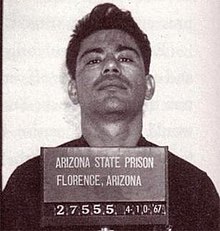This article includes a list of references, related reading, or external links, but its sources remain unclear because it lacks inline citations. (July 2024) |
Ernesto Miranda | |
|---|---|
 | |
| Born | Ernesto Arturo Miranda March 9, 1941 Mesa, Arizona, U.S. |
| Died | January 31, 1976 (aged 34) Phoenix, Arizona, U.S. |
| Cause of death | Murder by stabbing |
| Resting place | City of Mesa Cemetery, Arizona |
| Occupation | Laborer |
| Known for | Miranda v. Arizona |
| Criminal status | Deceased [a] |
| Conviction(s) | Kidnapping, rape |
| Criminal penalty | 20 to 30 years in prison |
Ernesto Arturo Miranda (March 9, 1941 – January 31, 1976) was an American laborer whose criminal conviction was set aside in the landmark U.S. Supreme Court case Miranda v. Arizona, which ruled that criminal suspects must be informed of their right against self-incrimination and their right to consult with an attorney before being questioned by police. This warning is known as a Miranda warning. Miranda had been convicted of kidnapping, rape, and armed robbery charges based on his confession under police interrogation.
After the Supreme Court decision invalidated Miranda's initial conviction, the state of Arizona tried him again. At the second trial, with his confession excluded from evidence, he was convicted. He was sentenced to 20–30 years in prison, but was paroled in 1972. After his release, he returned to his old neighborhood and made a modest living autographing police officers' "Miranda cards" that contained the text of the warning for reading to arrestees. Miranda was stabbed to death during an argument in a bar in Phoenix, Arizona on January 31, 1976. A Mexican man, Eseziquiel Moreno Perez, was charged with the murder of Miranda, but fled to Mexico and has never been located.
Cite error: There are <ref group=lower-alpha> tags or {{efn}} templates on this page, but the references will not show without a {{reflist|group=lower-alpha}} template or {{notelist}} template (see the help page).